

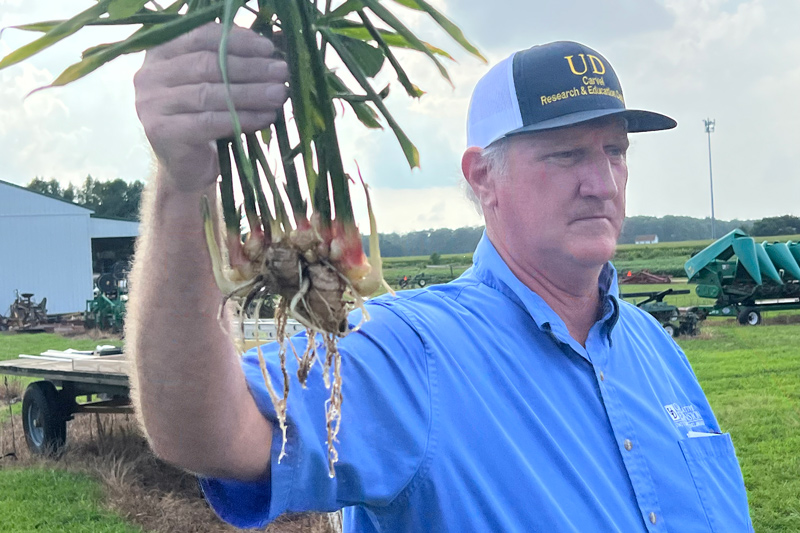
Agricultural missionary
Photos by Michele Walfred, Katie Young, Maria Errico and courtesy of Gordon Johnson May 25, 2023
Gordon Johnson caps incredible career in agricultural science
After his three decades serving Delaware agriculture, friends and colleagues of Gordon Johnson, a Cooperative Extension fruit and vegetable specialist and assistant professor in the Department of Plant and Soil Sciences, gathered at the Harvest Ridge Winery in Marydel to celebrate Johnson’s upcoming retirement. Surrounded by acres of vineyard grapes that Johnson plays a role in keeping healthy, tributes flowed in recognition of his storied and diverse professional journey.
While conversations and wine flowed, guests learned they had another reason to celebrate. Word was out that Johnson was the 2023 recipient of the University of Delaware’s Worrilow Award, a prestigious honor for College of Agriculture and Natural Resources (CANR) alumni.
Named in honor of George M. Worrilow, former CANR dean and UD visionary, the award was officially presented to Johnson at a May CANR awards ceremony.
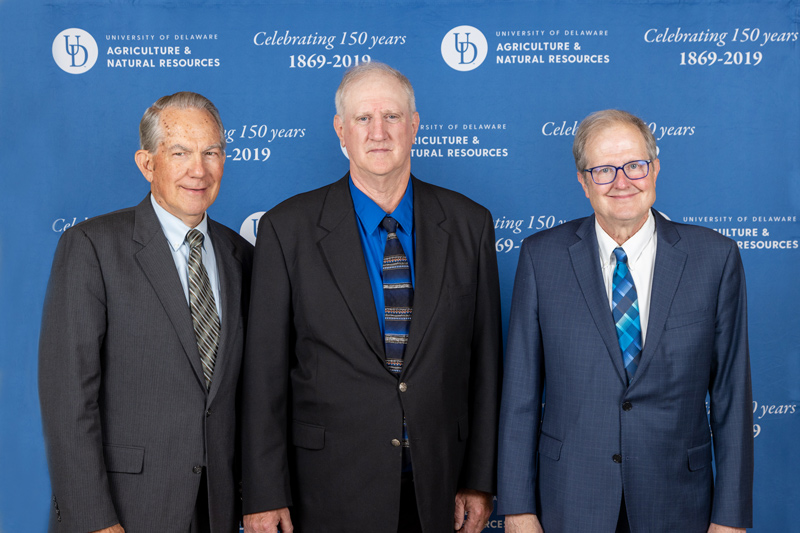
Unlike Blue Hen alumni who return to UD for their careers, Johnson was an employee before he was a graduate. In 2011, Johnson received his doctorate at age 54. The capstone accomplishment was a culmination of his impressive path of personal growth, servant leadership and curiosity about all things agriculture.
Johnson was born into agriculture and never left.
The youngest of four, Johnson’s father ran a small 180-acre dairy farm just south of Gettysburg, Pennsylvania. His mother, a 40-year leader of his local Mt. Joy 4-H club, saw to it that her youngest child was an active participant in what continues to be the largest youth development program in the country.
“Anything I could do in that program, I did,” Johnson said of his nine years with 4-H. “I pretty much did all the standard agriculture-related ones — projects in vegetables and field crops, soil conservation, gardening and woodworking.”
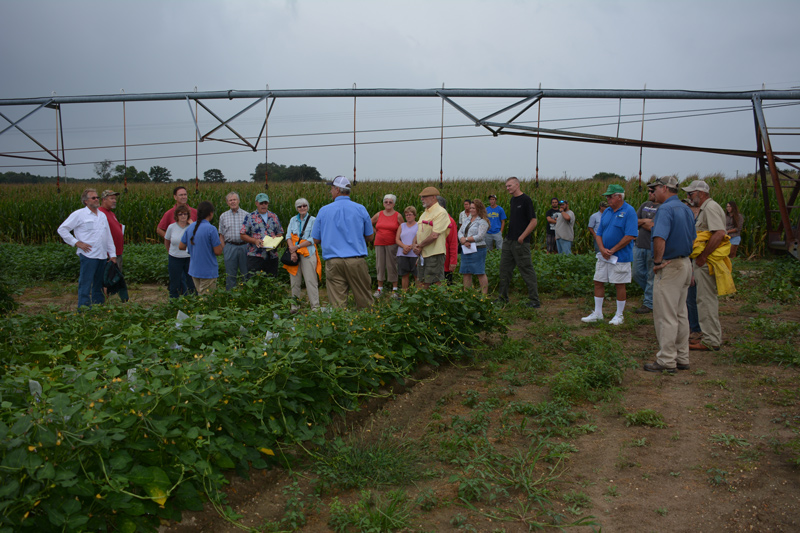
Johnson took advantage of public speaking and demonstration lessons and competitions — valuable life skills on which he later leaned. He took on citizenship and leadership roles, represented Pennsylvania at National 4-H Congress and was a delegate to National 4-H Conference.
Johnson also participated in local and national FFA. Today, he delights in stumping friends on his role at the National FFA Convention. The agriculture talent auditioned for and won an honor representing his state. It wasn’t for corn, cows or combines. It was for the trombone. Johnson was one of two Pennsylvanians selected for the FFA’s national band.
When Johnson was 14, his father passed away; he assumed a more active role on the family farm. After high school, he farmed full-time for three years before pursuing higher education. Proximity was necessary, and the University of Maryland offered a reasonable commute. Johnson arose at 4 a.m. to milk 45 cows for two hours. He then drove two hours to College Park, Maryland for classes, returning home to milk the cows for the second time. That challenging commute lasted only one semester.
“I said to myself, ‘The heck with the cows,’” Johnson said with a laugh.
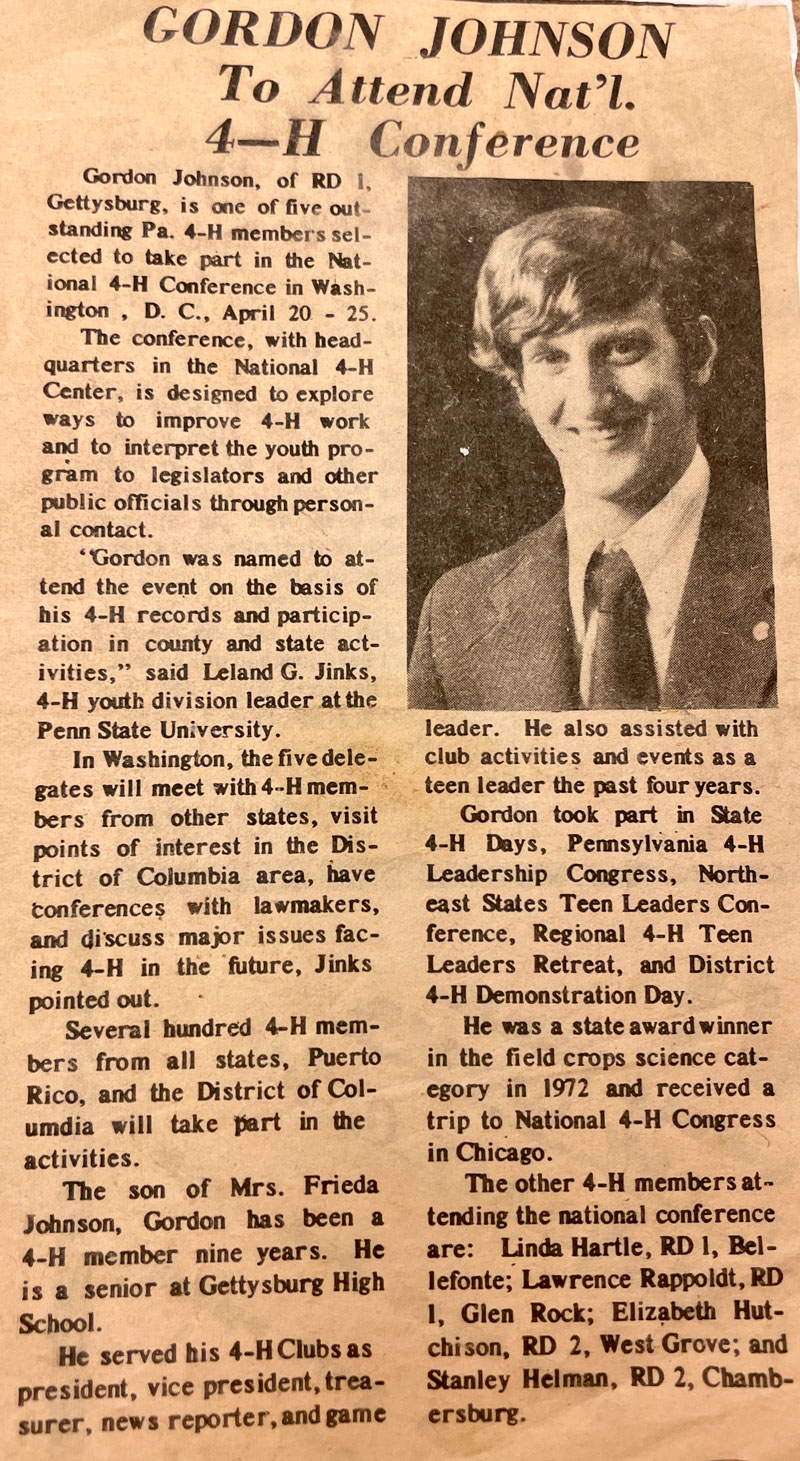
He moved to campus, joined an agricultural fraternity and graduated in three years, cum laude, with a degree in agronomy.
Immediately after college, Johnson served in the Peace Corps. His adventure took him 8,600 miles away to the Republic of Seychelles. The tropical archipelago of 100 small islands is 900 miles off the coast of Africa in the middle of the Indian Ocean.
“We were agriculture officers,” Johnson said. “It was essentially an extension system. That is where my extension career started.”
He served for two years, immersed in tropical fruits and vegetables, becoming fluent in French Creole and meeting his future wife Yacintha.
Upon his return stateside, Johnson earned his master’s degree in horticulture and vegetable crops at Clemson University, got married and returned to Seychelles for a three-year stint as a high school teacher in their agriculture program at Seychelles Polytechnic. As one of the taller instructors, Johnson introduced basketball, forming a team with students with little knowledge of the sport.
Johnson returned to the U.S. in 1987 and worked as a research technician in a biotechnology firm studying endophytes, microscopic organisms that live inside plants, and how they might deliver products to crops. Promoted to senior scientist, he established and managed a research farm on the Eastern Shore of Maryland until 1993.
Johnson began his UD career with Cooperative Extension in 1994 as a horticulture and specialty crop agent in Kent County, expanded to include the county agriculture agent in 1997 and, with his dairy experience, tapped as the dairy agent in 1999. During this time, Johnson formalized another passion, writing, becoming one of the first extension agents to blog on commercial agriculture and horticulture, a favorite resource for growers.
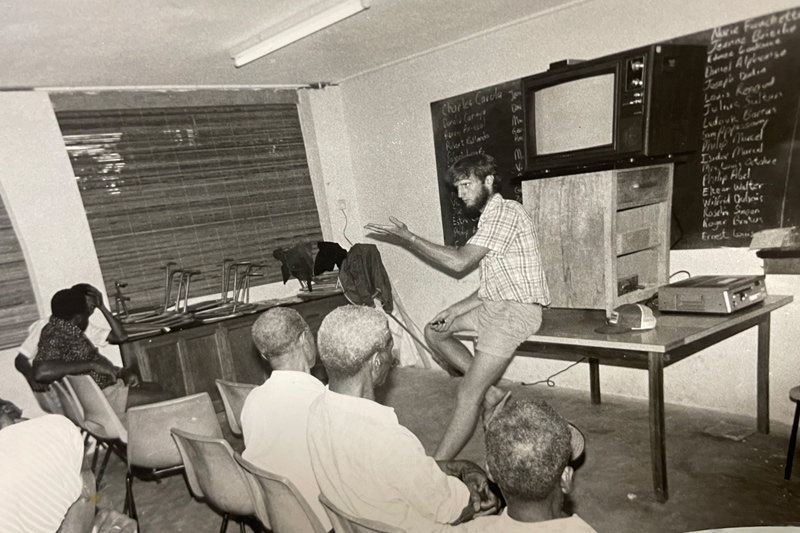
As his 72-page Worrilow Award nomination document enumerates, Johnson’s extension roles expanded. His innate curiosity and learned life experiences made him a perfect person to develop and deliver new ideas, initiatives and programs. And, looking back, what didn’t he teach? Johnson taught short courses on ornamental plants. He initiated the Kent County master’s series for field crops and conducted workshops on fruit and vegetable production. Johnson developed programs in organic farming, dairy records, agritourism, entrepreneurship and business management. He facilitated the committee that developed Delaware’s Nutrient Management Program and initiated statewide produce food safety education. His publications, presentations and programs fill pages upon pages, testimony to diverse service to Delaware agriculture.
While working as an agricultural agent, Johnson earned a doctorate in plant sciences from the University of Delaware in 2011. His research on pad soils examined the soil under old poultry houses and how to return that land to agricultural production. At the time, Johnson estimated approximately 2,400 dilapidated poultry houses existed in the region. Nothing would grow in soil loaded with salts from an accumulation of ammonium, nitrate, and potassium.
“I came up with this idea to tie up the nitrogen salts by adding wood products, sawdust or wood chips, and part of the project we shared was that we could grind up the whole poultry house and use that to remediate the site,” Johnson said.
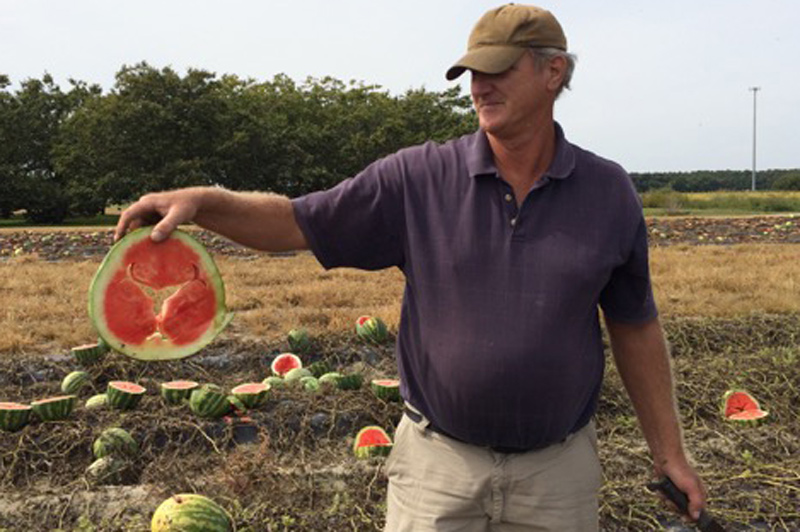
Afterward, salt-tolerant plants grew for two to three years where old poultry houses once stood. Because remediation is an involved, expensive process for farmers, Johnson’s research was the basis for a national conservation standard for the U.S. Department of Agriculture Natural Resources Conservation Service and cost-share funding for landowners.
Balancing a demanding career and simultaneously working toward a doctorate was challenging, but a motivated Johnson had role models to follow.
“One of my inspirations was Susan Barton [the 2022 Worrilow Award winner], who also completed her doctorate while working in Extension,” Johnson said. “I was very much an older student working in UD Cooperative Extension when I started my doctorate in plant science. This reinvigorated my career at UD.”
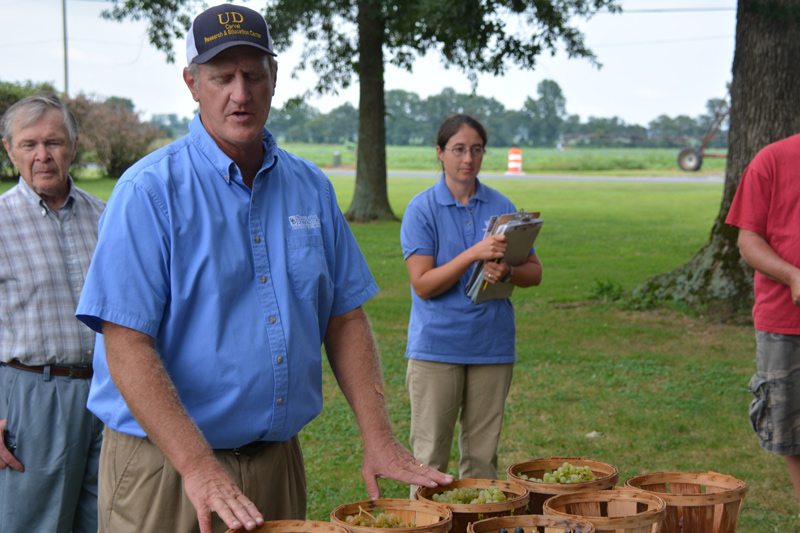
In 2010, Johnson became the extension fruit and vegetable specialist and a faculty member in the Department of Plant and Soil Sciences. He was a liaison and adviser to the Fruit and Vegetable Growers Association of Delaware. Johnson led targeted training with an emphasis on the safety of fruits and vegetables. He conducted applied research on vegetable, fruit and specialty horticulture crops.
That same year, Johnson began his seminal research on the cause of hollow heart in watermelons, which identified improper pollination as the significant factor in the fruit defect.
Johnson is a confessed obsessive writer. He is a monthly contributor to The Delmarva Farmer, with approximately 140 articles written to date. For 27 weeks of the year, his prolific expertise filled the pages of the Weekly Crop Update, filling a void in vegetable horticulture journalism.
Johnson wrote and managed more than 50 grants, many of which were specialty grants looking at alternative crops for local farmers and offering ways to extend their growing season. Johnson taught undergraduate and graduate courses at UD like Introduction to Sustainable Food Systems (PLSC 145) and Vegetable Science (PLSC 302). Johnson was an adviser to more than 20 graduate and undergraduate students, three of whom explored careers in Cooperative Extension.
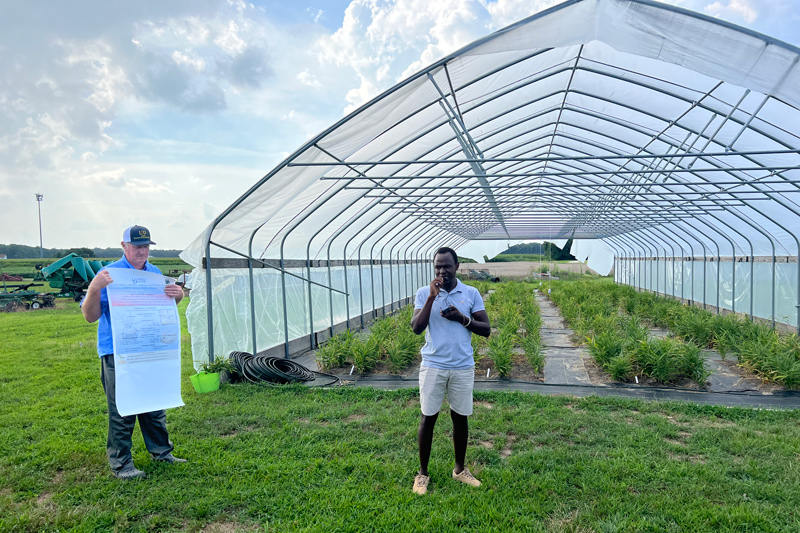
Johnson’s career awards are many. Now added to that impressive list is UD’s 2023 Worrilow Award.
“I was surprised and appreciative for being nominated by my alumni peers,” Johnson said.
He credits colleagues and former Worrilow honorees Joanne Whalen, Bob Mulrooney, Derby Walker, Ed Kee, and other long-time extension agents and specialists who served as role models and mentors.
In retirement, Johnson looks forward to growing peaches on a four-acre orchard on his small farm in Denton, Maryland, contributing to agriculture academia by writing articles and continuing to teach and inspire students. He’ll also fit in some travel, perhaps another visit to the Republic of Seychelles. Johnson recently returned from Tanzania to visit the home of one of his most recent graduate students, Shem Elias, whom he mentored to grow baby ginger.
Little doubt exists among his friends, family and colleagues that Gordon Johnson’s retirement will be purposeful. Johnson’s personal history and career are a testimony to Cooperative Extension’s motto of “extending knowledge and changing lives.”
“The key,” Johnson said, “has been a dedication to a life of service to the agricultural community — broadly defined — in the state, regionally and nationally and to represent the University of Delaware College of Agriculture and Natural Resources in the best light and take the resources that CANR and the broader University offer to the community.”
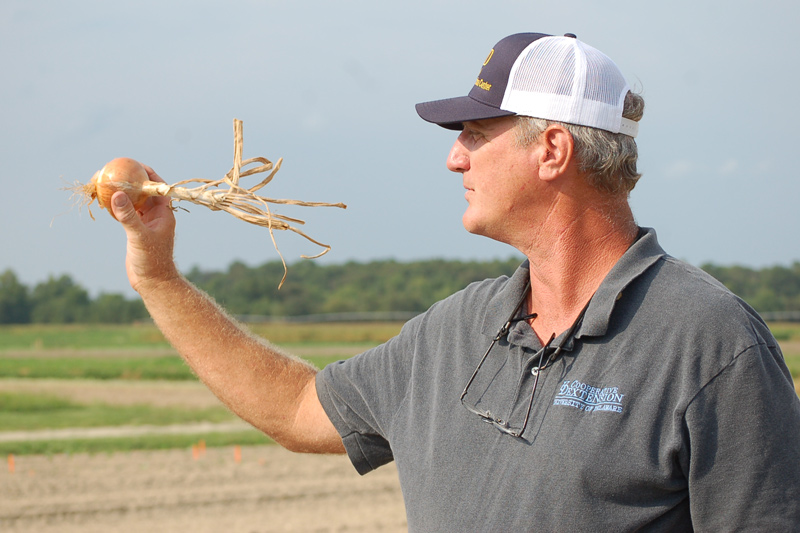
Contact Us
Have a UDaily story idea?
Contact us at ocm@udel.edu
Members of the press
Contact us at 302-831-NEWS or visit the Media Relations website

